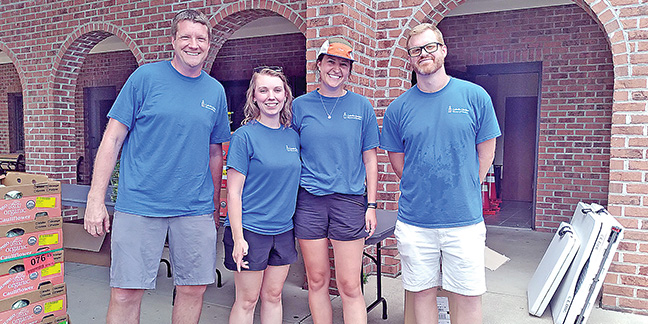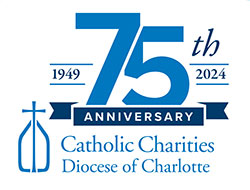Editor's note: Catholic Charities Diocese of Charlotte is highlighting the seven themes of Catholic Social Teaching for its year-long 75th anniversary celebration. This week, the focus is on “Caring for the Poor and Vulnerable.” A basic moral test is how our most vulnerable members are faring. In a society marred by deepening divisions between rich and poor, our tradition recalls the story of the Last Judgment (Mt 25:31-46) and instructs us to put the needs of the poor and vulnerable first.
 CHARLOTTE — Every Tuesday and Thursday, cars line up outside the Diocesan Pastoral Center in Uptown Charlotte, driven by people in need who come to receive food from Catholic Charities. Similar scenes play out at the agency’s offices in Asheville and Winston-Salem.
CHARLOTTE — Every Tuesday and Thursday, cars line up outside the Diocesan Pastoral Center in Uptown Charlotte, driven by people in need who come to receive food from Catholic Charities. Similar scenes play out at the agency’s offices in Asheville and Winston-Salem.
By feeding people in need, agency staff members and volunteers are carrying out one of the seven principles of Catholic social teaching: helping the poorest and most vulnerable among us.
The Church is called to care for those living on the margins, and all Catholics are urged to help our brothers and sisters in need.
Much of the local Church’s work to help the poor is directed through Catholic Charities, which has seven locations across western North Carolina that deliver aid and services to people in need.
Last year alone, agency staff and 200-plus volunteers distributed more than 630,000 pounds of food to 16,000 people and supported hundreds of others with clothing, infant supplies, burial assistance, housing, counseling and more.
Most people the agency serves receive direct assistance – help with paying their rent or utility bills, food aid to supplement what they receive from government assistance, and baby items such as diapers, wipes and clothing, says Catholic Charities’ executive director Gerry Carter.
Yet Catholic Charities does not just hand out food or offer one-time services, Carter adds. The agency takes a holistic approach to its aid work – focusing on lifting people out of poverty with personalized support to remove obstacles to self-sufficiency.
Through its Transition Out of Poverty (TOP) program, Catholic Charities provides a case management mentor who accompanies people and helps them find solutions to challenges such as unemployment, housing instability, health care and education. The program also conducts workshops and special training sessions to help people succeed.
“Perhaps the greatest way in which Catholic Charities addresses poverty is by intimately sharing in the ministry of the Church to show love for our neighbors in need,” Carter says. “We work to reduce the oftentimes crushing effects of poverty through both direct assistance and case management services.”
The agency helps people “develop a custom path out of poverty by identifying and removing obstacles that prevent them from achieving their dreams,” he explains.
Quoting Pope Benedict XVI’s encyclical “Deus Caritas Est,” Carter notes that for the Church, “charity is not a kind of welfare activity which could equally well be left to others, but is a part of her nature, an indispensable expression of her very being.”
This call, based on scripture and Catholic teaching, is also reflected in the agency’s Passion Statement: “The love of Christ impels us to serve our neighbors in need – we cannot do otherwise.”
The option for the poor is not only critical for meeting the material needs of the poor, it also has serious implications in the spiritual lives of Catholics.
“Beyond the call to assist those in need, we are taught by Jesus that our actions or inactions in responding to the plight of the poor and vulnerable has a direct impact on our eternal life,” says Joe Purello, Catholic Charities’ director of social concerns and advocacy.
How can Catholics follow the Church’s call to help the poor and vulnerable?
“The most obvious place to start is through our prayer life and participation in Eucharistic celebrations,” Carter suggests. “We all have the opportunity to offer to God both thanksgiving for our blessings and prayers for those less fortunate.”
People can help Catholic Charities, their local parish or community aid organizations by volunteering and making financial contributions.
“For some of us, we can participate in direct service by volunteering to feed the hungry and shelter the homeless,” Carter says. “For others, in addition to our prayers, we can share in the ministry of Catholic Charities by ensuring that necessary financial resources are available to serve the needy.”
— Christina Lee Knauss
Get involved with Catholic Charities

Join Catholic Charities in its mission to help those in need and spread the love of Christ:
Learn More: Visit ccdoc.org to discover how Catholic Charities is making a difference in the Diocese of Charlotte.
Find Help: If you or someone you know needs assistance, Catholic Charities is here to support you. Visit ccdoc.org/services for information.
Donate: Consider donating to Catholic Charities at ccdoc.org/donate. Your generous contribution can change lives.
Volunteer: Make a direct impact by volunteering with Catholic Charities. Learn more about volunteer opportunities at ccdoc.org/volunteer.






